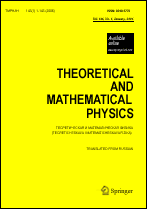|
A Step-Function Approximation in the Theory of Critical Fluctuations
P. L. Rubin
P. N. Lebedev Physical Institute, Russian Academy of Sciences
Abstract:
We consider fluctuations near the critical point using the step-function approximation, i.e. the approximation of the order parameter field $f(x)$ by a sequence of step functions converging to $f(x)$. We show that the systematic application of this method leads to a trivial result in the case where the fluctuation probability is defined by the Landau Hamiltonian: the fluctuations disappear because the measure in the space of functions that describe the fluctuations proves to be supported on the single function $f\equiv 0$. This can imply that the approximation of the initial smooth functions by the step functions fails as a method for evaluating the functional integral and for defining the corresponding measure, although the step-function approximation proves to be effective in the Gaussian case and yields the same result as alternative methods do.
Keywords:
critical fluctuations, non-Gaussian functional integral, Landau Hamiltonian, step-function approximation.
Received: 15.11.2001
Revised: 26.02.2002
Citation:
P. L. Rubin, “A Step-Function Approximation in the Theory of Critical Fluctuations”, TMF, 132:1 (2002), 141–149; Theoret. and Math. Phys., 132:1 (2002), 1012–1018
Linking options:
https://www.mathnet.ru/eng/tmf352https://doi.org/10.4213/tmf352 https://www.mathnet.ru/eng/tmf/v132/i1/p141
|


|




 Contact us:
Contact us: Terms of Use
Terms of Use
 Registration to the website
Registration to the website Logotypes
Logotypes








 Citation in format
Citation in format 